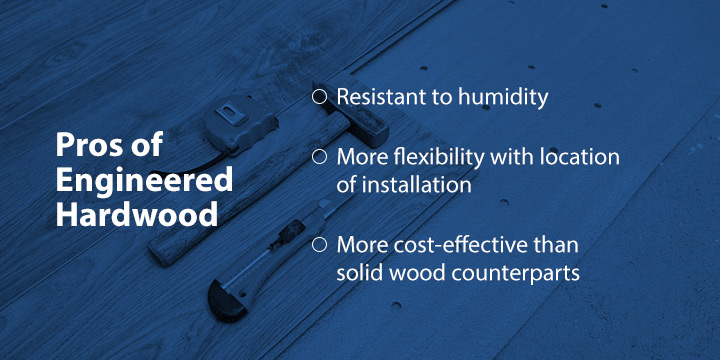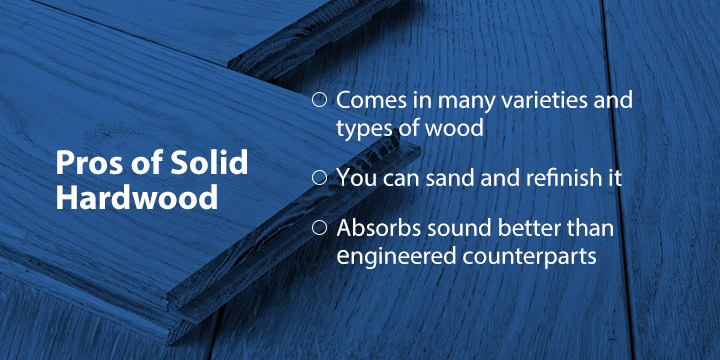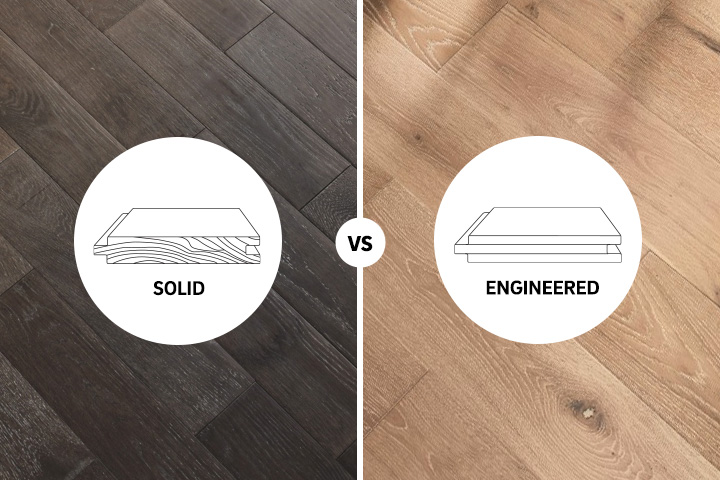If you’re looking at hardwood flooring options for your home, you have a major choice ahead of you: engineered or solid. There’s no question about it: Both types of hardwood floors are beautiful. Not only are they currently “on trend,” as the experts would say, but they can make any home look elegant and classy without the hassle of carpet.
That’s the good news. So what’s the bad news? Well, the bad news is that choosing hardwood floors isn’t as simple as pointing to a piece of wood and saying “I’ll take that one.” In fact, thanks to modern technology, homeowners aren’t even choosing between two different stains or two varieties of wood. Today, homeowners actually have the choice between solid hardwood flooring and engineered hardwood flooring.
This part is where some people get confused. After all, “engineered hardwood” makes it sound like you’re buying a fake product and, if you’re like a lot of homeowners, you’ve discovered that “fake” products just don’t hold up as well as the Real McCoy. Until now.

Engineered hardwood isn’t “fake.” It’s made from real wood that has been processed in a way that actually provides you with a high-quality, good-looking floor. But, it’s a high-quality, good-looking floor that holds up to moisture and daily wear and tear in a way that hardwood floors might not. With the addition of engineered hardwoods to the flooring market, homeowners have some great new flooring options to consider, but it can quickly get confusing — and expensive — if you aren’t sure what you’re looking at. So, before you make any quick decisions, let’s take a few minutes to learn about your options.
What Is Engineered Hardwood?
Engineered hardwood flooring is made by bonding layers of wood together with adhesives under high pressure and heat. Thanks to its manufacturing process, this flooring is strong, solid and, unlike its traditional competitor, able to hold up better to humidity and moisture.
The other cool thing about engineered hardwood is that you can still sand and refinish it just like you would a solid hardwood floor, although it’s recommended that you only do so a few times over the lifetime of your flooring.

Pros of Engineered Hardwood
Because of the way engineered hardwood is produced, it’s especially resistant to humidity — unlike its solid hardwood competitor, which we’ll talk more about later. You don’t have to worry about your floor expanding and contracting with the seasons, which is great for homeowners because it takes away the concern about their flooring becoming warped or cupping over time.
The other thing a lot of people love about engineered hardwood is that its resistance to humidity means it can be installed in parts of your home where you’d never be able to install solid hardwoods. While there’s a lot of debate about just how far you can go with this flexibility, many contractors would say that engineered hardwood can stand up to installation on top of concrete, in a below-grade basement or even in the kitchen.
Sometimes people worry about the acoustics of hardwood floors in general, so you may be wondering about how engineered hardwoods hold up to the sound test. In general, you’ll find that the acoustics of engineered hardwood flooring aren’t too shabby either, but you’ll need to be very careful about how they’re installed — more about that later.
Depending on what product you choose, you may find that engineered hardwoods are more cost-effective. However, this breakdown isn’t always the case, so it’s important to do your homework to see how pricing compares between all the different products that are available.
Cons of Engineered Hardwood
A big concern some people have with engineered hardwood is “off-gassing,” or the emission of certain chemicals that come from the product. Off-gassing becomes a concern with the stain or topcoat that’s used to seal the flooring materials. Depending on what’s used for the top coat, it can contain certain resins and adhesives that give off toxins.
Some people don’t mind this risk, but others are very concerned about the potential for unwanted chemicals being released into the air in their home. Some companies that manufacture engineered hardwood work hard to make sure their products don’t do this, but it’s still important to do your homework and find out what their policies are for keeping their products environmentally friendly and keeping these toxins out of your home.
Some people would also say that acoustics are a problem with engineered hardwood. Granted, it doesn’t absorb sounds as well as its solid hardwood counterpart, but it may not be as much of a concern as you think. Why? Engineered wood has a resilient surface, which means it does absorb a significant amount of weight and noise. Some of its ability to absorb noise may depend on how it’s installed.
Engineered hardwoods can be installed as a “floating floor,” which means the new floor was snapped together over an existing floor, and no glue or nails were used to hold it in place. If you aren’t careful, a floating floor can be a challenge when it comes to noise control. However, you can reduce the noise that comes from walking on a floating floor if you’re willing to spend the money to purchase a high-quality acoustic underlay to be placed under the floor.
The final concern with engineered hardwoods is that while this product is more resistant to moisture, it’s not going to withstand high moisture levels. If your basement isn’t watertight, or water somehow gets in between the boards of your engineered hardwood, you’ll still run into issues. Make sure you’ve consulted with a contractor or flooring professional before placing engineered hardwoods in a basement or kitchen where they might be exposed to higher-than-recommended levels of moisture.
What Is Solid Hardwood?
Solid hardwood is exactly what it sounds like — planks of solid wood that have been milled from a piece of wood and then coated with a protective layer, typically either ceramic, aluminum oxide or an acrylic substance. Solid hardwood is usually cut pretty thick, around 3/4 of an inch, which means it can be sanded and then refinished many times over the lifespan of the flooring. This quality is great because it means you can keep your floors looking nice and new for a long, long time.
Most flooring professionals recommend that your home stay between humidity levels of 45 and 65 percent to sustain a hardwood floor. In addition, when solid hardwood is installed, it has to be nailed into the subfloor, which means it can only be installed above-grade. It can’t be installed over concrete, so it’s not going to work in a basement or on a slab.

Pros of Solid Hardwood
As we mentioned before, it’s hard to pin down whether solid hardwood is cheaper or more expensive than its engineered counterpart. However, there are times when it’s actually the same price or less. Do your homework and figure out what your options are. This solution may be more affordable than you think.
One of the great things about solid hardwood is that it comes in many varieties and types of wood, including oak, cherry and maple. Typically, homeowners will select the type of wood they want based on its hardness rating and cost. Once you’ve selected the wood, you can also choose from a variety of shades and colors. This ability to customize a look is appealing to many homeowners.
As we mentioned, solid hardwood is great because you can sand and refinish it throughout the life of the floor. If it gets scratched, or you just want to change the color of your floor, all you need is some elbow grease. This feature can be appealing to homeowners who enjoy home improvement projects or plan to keep their house — and its flooring — for a long time.
One other thing about solid hardwood floors is that they absorb sound better than their engineered counterparts. Now, part of this quality depends on how the floor has been installed, but in general, if you don’t want everyone in the house to hear every sound you make, solid hardwood is a good bet.
Cons of Solid Hardwood
One of the biggest problems with solid hardwood is that it reacts to humidity. In the summertime when it’s warm, it expands. In the winter when it’s cooler, it contracts. Over time, this dance can cause problems with bowing and warping. Flooring professionals know how to install solid hardwood and leave spaces for the expansion. It’s crucial that you make sure to have solid hardwood floors installed by an experienced installer who knows how to account for this expansion in the wood.
A professional flooring installer will also know that certain parts of the house should never, ever have hardwood flooring. These areas include your bathroom, kitchen and basement. If the flooring is placed in the bathroom or kitchen, you’re exposing it to a lot of water and moisture just by nature of what goes on in such rooms. In the basement, moisture is a problem, but you also can’t install solid hardwood on a concrete slab, which is what the floor of your basement is made of.

So What’s the Bottom Line?
Engineered wood flooring was once regarded as a pale imitation of solid hardwood, but improvements in the product quality have eliminated this perception. Solid hardwood may hold a slight edge in prestige for some people, but the lower cost and easier installation of engineered wood flooring give it the edge for others. Further, engineered wood uses less hardwood, a fact that appeals to environmentally conscious consumers. So, what’s your vote? I guess you will have to decide for yourself!
Sources:
https://www.thespruce.com/engineered-hardwood-vs-solid-flooring-1821677

